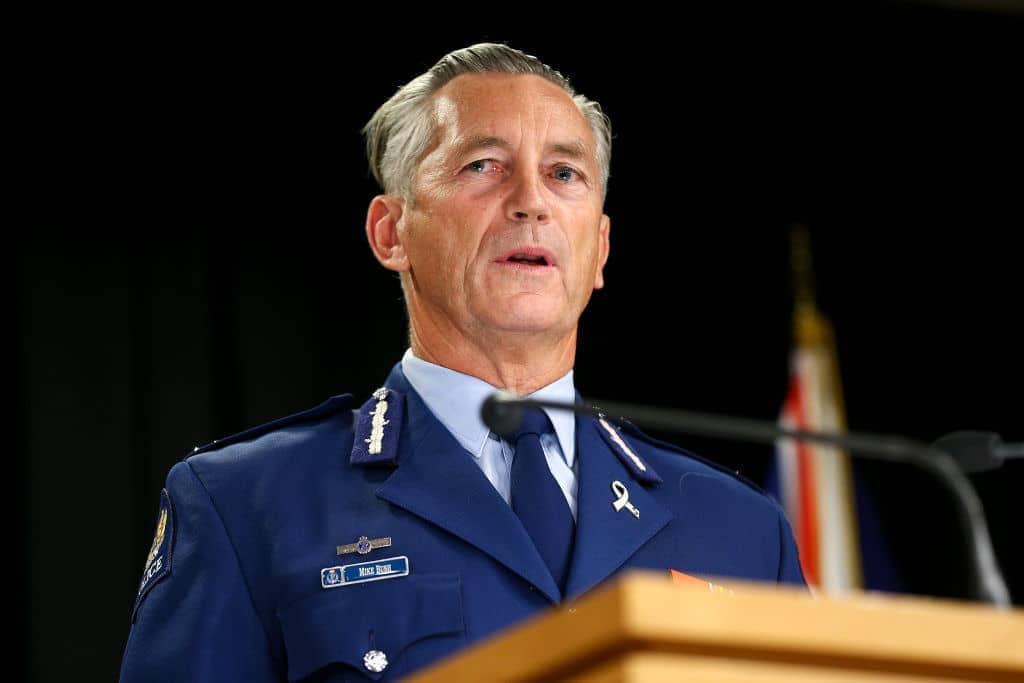Cressida Dick’s resignation earlier this year has opened up the race for the next Commissioner of the Metropolitan Police. Mike Bush, head of the New Zealand police force for six years until 2020, has reportedly put his helmet into the ring for the top job. But does London want a police chief who was criticised for his force’s slow response to the Christchurch terror attack?
Overseeing London’s police force is also a big step up for a copper who has until now presided over a nation whose population is little more than half of London’s 32 boroughs. Bush is helped by the fact his career-capping tenure as New Zealand’s police chief appears to have been spotless. Almost. It was he that was in charge on 15 March 2019, when an anti-Muslim fanatic spent nearly an hour rampaging through the country’s second-largest city, Christchurch, massacring 51 worshippers and injuring scores of others during Friday prayers.
The assailant, Brenton Tarrant, 28, became the only person in New Zealand ever to receive a whole life order, passed down after four days of gruelling testimony from survivors. When I was seated a few yards from the grey-faced Tarrant in his baggy prison overalls during the hearing, I thought of Bush every now and then when the victim impact statements were read out. It took officers an agonisingly slow 21 minutes to respond as the white supremacist carried out his attack, first at a mosque before driving across town for another round of bloodshed at an Islamic centre. His vehicle was eventually rammed off the road by a couple of off-duty coppers who simply happened to be in the Garden City that afternoon.
The Kiwi commissioner will still need to convince Patel that he’s made of sterner stuff than the other candidates
Given that millions of people were able to watch the attack unfold in real time over a Facebook live stream, it’s difficult to see how, in Bush’s estimation, his officers acted ‘as quickly as humanly possible’ to stop the carnage. An infinitely more complex city, London has suffered more than its share of terrorist incidents in the past. Its people cannot afford to wait 21 minutes in the event of another attack.
Bush may have his work cut out for him if he’s to nab the Met’s top job, although it shouldn’t be too hard for him to make a persuasive case for why he’d be better than the previous incumbent. Dick was ousted in February after a series of calamitous missteps, culminating in the ghastly handling of the case of Sarah Everard, who was raped and murdered by one of her serving officers.
Bush is a self-styled ‘commissioner of change’. In New Zealand, he worked impressively hard to fashion his force into a ‘compassionate, caring police service’. It seems unlikely he would have sent his men – as the Met did – to Clapham Common to break up a vigil held in memory of Everard. But presumably the same could be said of the four other contenders under active consideration. Similarly, that he hails from one of the few countries other than Britain that maintains an unarmed police force is likely to be advantageous for him.
The Kiwi commissioner will still need to convince Patel that he’s made of sterner stuff than the others — not least Sir Mark Rowley, the former counterterrorism boss who led Surrey police. He should also bear in mind that fresh faces from Down Under aren’t quite the fabulous catch they may have once appeared.
Such was the fate of Auckland businessman Sir John Hood, who, in October 2004, became the first outsider to lead the University of Oxford. According to some bright spark at the time, Hood’s credentials looked set to make him ‘the most significant infusion of foreign blood for the venerable institution since Emo of Friesland became its first overseas student, in 1190’. Alas, revolution is easier said than done, and, unsurprisingly, 900 years of accumulated Oxford dust proved too much for Hood to sweep away and start afresh.
Dame Lowell Goddard was another who arrived in London in 2015 from her rural retreat north of Wellington to chair the historical child abuse inquiry in England and Wales. In the event, the esteemed judge managed to quickly startle resident barristers by admitting she was ‘unsure of local law’. Goddard resigned from the position 18 months later in dramatic fashion, defending herself from ‘malicious, defamatory attacks’ by the British media.
The track record of Bush’s fellow Kiwis doesn’t mean that his chances of taking over the Met are scuppered before they’ve begun. But after the debacle of Dick’s leadership of the Met, London can ill afford another bad choice for its top job in the police.






Comments